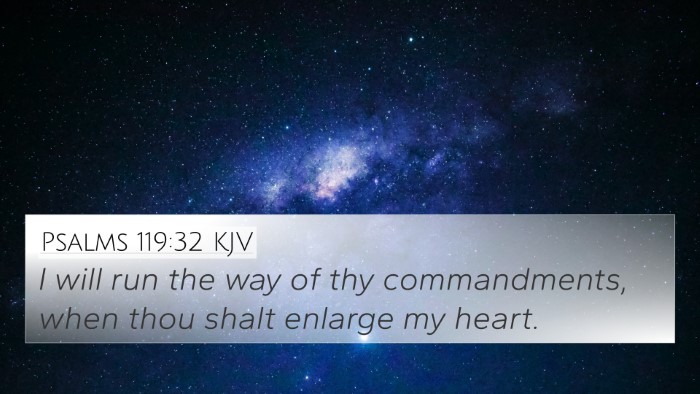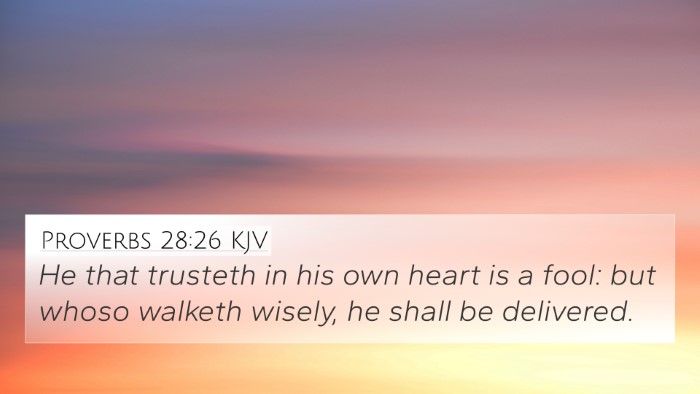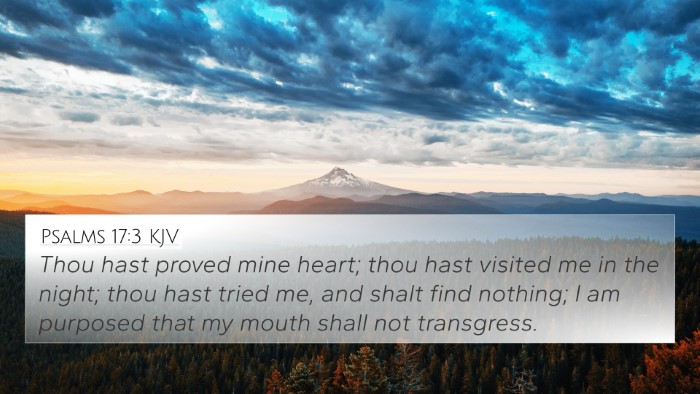Psalms 139:24 - Understanding the Verse
Bible Verse: Psalms 139:24 - "And see if there be any wicked way in me, and lead me in the way everlasting."
This verse is a heartfelt appeal for divine guidance and introspection. The Psalmist seeks God’s scrutiny of their innermost thoughts and intentions while expressing a desire for a righteous path. This passage encapsulates the essence of self-examination and openness to God’s leading in life.
Insights from Public Domain Commentaries
-
Matthew Henry:
Henry emphasizes the importance of self-examination and reflects on the necessity for believers to invite God's inspection. He notes that acknowledging our faults is the first step toward moral rectitude, and we must actively seek correction and guidance from God.
-
Albert Barnes:
Barnes interprets this verse as a profound request for God to reveal hidden sins and lead the believer towards eternal life. He argues that the 'wicked way' signifies not only overt sins but also subtle inclinations that may lead us astray from God’s will.
-
Adam Clarke:
Clarke points out that the prayer is both for revelation and healing. He acknowledges the duality of the request to uncover evil while also seeking direction towards righteousness. This aligns one's paths with God’s eternal truth.
Significance of the Verse
This verse is significant for its deep call for honesty before God. It instills the notion that personal introspection is not merely a solitary act; instead, it requires divine assistance to navigate the right path. The request to "lead me in the way everlasting" serves as a reminder that following God leads to eternal life, emphasizing the dual aspect of repentance and redirection towards holiness.
Bible Verse Cross-References
- Psalm 139:1-2: "O Lord, you have searched me and known me!" - This passage underscores God's omniscience, which relates to the Psalmist's plea for inward inspection.
- Proverbs 4:26: "Ponder the path of your feet, and let all your ways be established." - Highlights the importance of contemplating one's actions, echoing the self-examination theme in Psalms 139:24.
- Jeremiah 17:10: "I, the Lord, search the heart and examine the mind." - Emphasizes God’s role in understanding our inner beings, paralleling the request for divine observation.
- Matthew 7:3-5: "Why do you see the speck that is in your brother's eye, but do not notice the log that is in your own eye?" - A reminder that before we can guide others, we must first be introspective and aware of our own faults.
- Galatians 5:16-17: "But I say, walk by the Spirit, and you will not gratify the desires of the flesh." - Encourages believers to seek spiritual guidance in their lives, aligning with the theme of divine leading in Psalms 139:24.
- Romans 12:2: "Do not be conformed to this world, but be transformed by the renewal of your mind." - Stresses the need for continual renewal and guidance from God, akin to the Psalmist's request for leading in the right way.
- Philippians 1:9-10: "And it is my prayer that your love may abound more and more, with knowledge and all discernment..." - Reflects a similar sentiment of seeking divine help in understanding and righteous living.
Thematic Bible Verse Connections
The theme of divine guidance permeates the entirety of Scripture, linking Psalms 139:24 with various other Biblical passages that invite self-examination and a quest for righteousness. These connections provide a rich context that enhances our understanding of the original verse.
The Role of Cross-Referencing Biblical Texts
Engaging in cross-referencing allows for a deeper exploration of themes within the Bible. For instance, the connections between Psalms 139:24 and New Testament teachings provide both historical and theological insights into God's persistent call for believers to seek Him wholeheartedly.
Tools for Bible Cross-Referencing
Utilizing a Bible concordance or cross-reference guide can be immensely beneficial for understanding connections between scriptural texts. Employing these tools will assist in conducting a comprehensive Bible study that observes both thematic and contextual references.
Effective Cross-Referencing Bible Study Methods
When studying scriptures like Psalms 139:24, it can be helpful to:
- Identify recurring themes across different books.
- Utilize Bible reference resources to explore common subjects.
- Compare and contrast how various authors address similar concerns.
- Observe how different passages support or illuminate the meanings of each other.
Summary
In conclusion, Psalms 139:24 serves as a poignant reminder of the need for divine introspection and guidance. The insights drawn from the public domain commentaries underline the importance of self-reflection, repentance, and the pursuit of righteousness through God’s leading. Cross-referencing biblical texts enriches our understanding, illuminating the intricate connections woven throughout the Scriptures that direct us towards eternal life in Christ.
Call to Action
As you explore the depths of this verse, consider how personal introspection and divine guidance play critical roles in your walk with God. Utilize the suggested tools and methods to enhance your Bible study experience and deepen your understanding of the Scriptures.


















